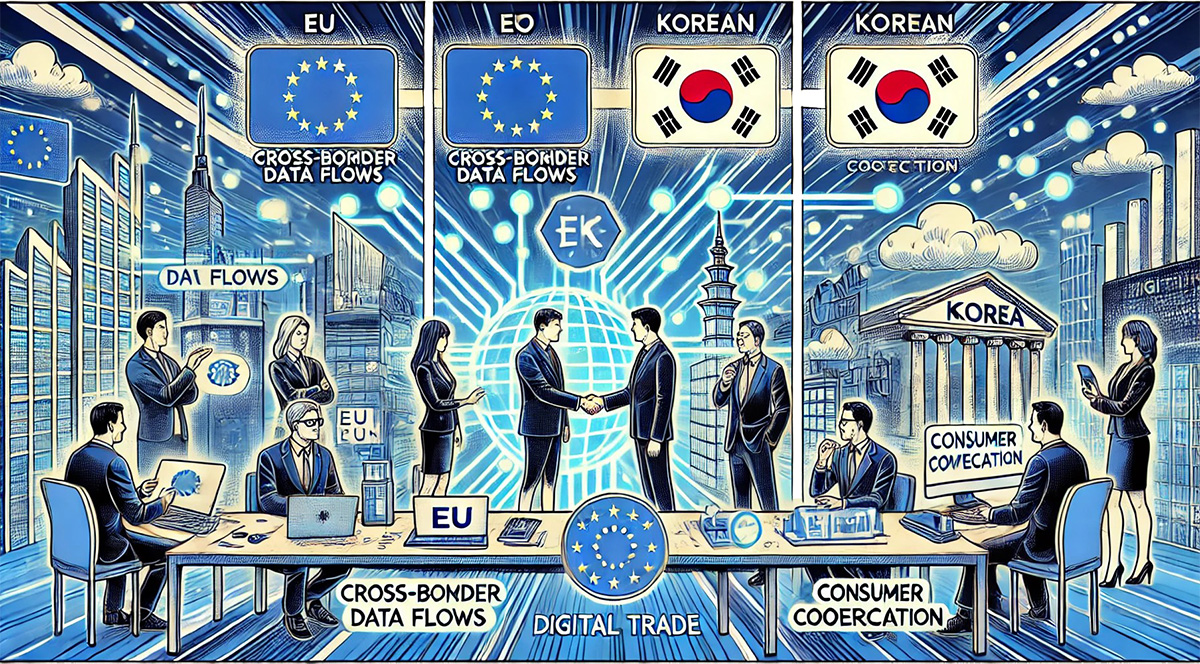
The European Union (EU) and the Republic of Korea have recently achieved significant milestones in enhancing their digital trade relations, culminating in the conclusion of negotiations for a landmark Digital Trade Agreement (DTA) on March 10, 2025. This agreement underscores both parties’ commitment to fostering a robust and forward-looking partnership capable of navigating the rapidly evolving digital landscape.
Background and Evolution of EU-Korea Digital Trade Relations
The foundation of EU-Korea economic relations was laid with the EU-Korea Free Trade Agreement (FTA) in 2011, which has since facilitated a substantial increase in bilateral trade, reaching €132 billion in 2022. Building upon this success, both parties recognized the growing importance of digital trade and sought to establish a framework to address emerging challenges and opportunities in the digital economy.
In November 2022, the EU and Korea signed a set of Digital Trade Principles, reflecting their shared vision for an open digital economy and setting the stage for more detailed negotiations. This initiative was further bolstered by the launch of the EU-Korea Digital Partnership in June 2023, aimed at strengthening cooperation in areas such as semiconductors, high-performance computing, and artificial intelligence.
Key Provisions of the Digital Trade Agreement
The DTA encompasses several critical areas designed to facilitate and secure digital trade between the EU and Korea:
- Cross-Border Data Flows: The agreement establishes rules to ensure the free flow of data between the two economies while upholding high standards of privacy and personal data protection.
- Electronic Transactions: It recognizes the legal validity of electronic contracts and signatures, promoting seamless digital transactions across borders.
- Consumer Protection: The DTA includes provisions to enhance online consumer trust and address issues such as unsolicited direct marketing communications.
- Regulatory Cooperation: Both parties have committed to ongoing collaboration on digital trade regulations to prevent unjustified barriers and ensure a fair and open online environment.
Implications for Businesses and Consumers
For businesses, particularly micro, small, and medium-sized enterprises (MSMEs), the DTA offers increased legal certainty and reduced administrative burdens, enabling more efficient engagement in digital trade. European companies, for instance, can serve Korean customers directly from Europe with greater ease.
Consumers stand to benefit from strengthened protections in digital transactions, fostering greater trust and confidence in online activities. The agreement’s emphasis on privacy and data protection aligns with the EU’s commitment to placing individuals and their rights at the center of digital and data policies.
Next Steps and Future Outlook
Following the political conclusion of negotiations, both the EU and Korea will undertake respective procedures to formalize the DTA, including legal reviews and translations. On the EU side, the proposal will be presented to the Council and the European Parliament for approval.
The DTA not only complements the existing FTA but also reinforces the broader EU-Korea Digital Partnership, positioning both economies at the forefront of setting high-standard digital trade rules globally. As digital trade continues to grow, this agreement serves as a model for future collaborations, emphasizing the importance of open, fair, and secure digital economies.
In conclusion, the EU-Korea Digital Trade Agreement represents a significant advancement in international digital trade relations, promising substantial benefits for businesses and consumers alike while reinforcing the strategic partnership between the European Union and the Republic of Korea.
Summary by DigitalTrade4.EU
